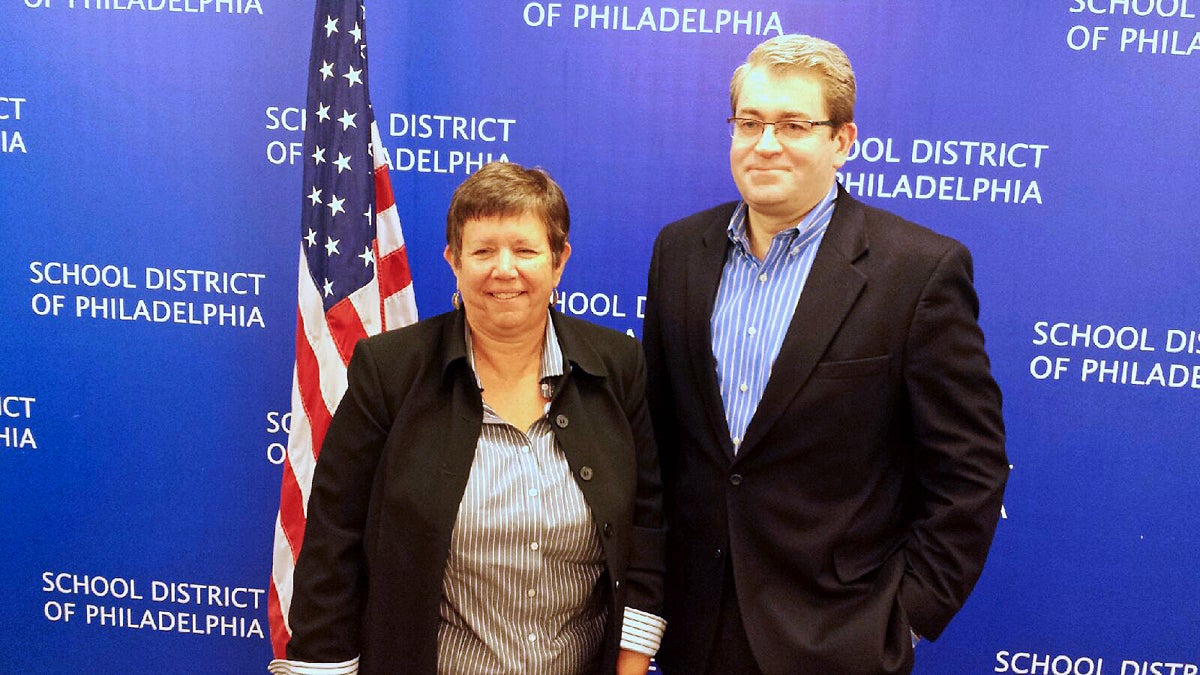Neff, Green present unified front despite shake-up in Philly school governance

Marjorie Neff and Bill Green present a unified front during a news conference held at Philly schools headquarters Tuesday (Kevin McCorry/WHYY)
In the wake of the recent School Reform Commission shake-up, Marjorie Neff and Bill Green presented a unified front Tuesday at a lighthearted news conference at Philadelphia School District headquarters.
Green, a former city councilman who left his post to become SRC chair in January 2014, was stripped of the leadership position by Gov. Tom Wolf on March 1.
Wolf tapped Neff – a former district principal and teacher who became a commissioner in July – to become chair, saying that she “shared his vision for investing in public education.”
On Tuesday, both commissioners met with reporters in hopes of refocusing the public’s attention on what they described as a shared quest to improve educational outcomes for the city’s children.
“One of the reasons a dispute over the title of chair doesn’t serve children is because it would have created a continuing partisan issue in Harrisburg,” said Green. “And, frankly, that is not in children’s interest, not just in Philadelphia, but across the commonwealth.”
On Monday, Green announced that he would abandon plans to challenge the legality of Wolf’s move in court.
“It speaks to his dedication to this service, because this is public service,” said Neff. “And it’s going to make it easier for us to work together.”
Both believe the public’s attention would be better focused on the prospect of the district securing additional funding from the city and the state.
“We have schools where children don’t have the basic supplies that they need, and this would go a long way to, not only closing the gap, but moving [Superintendent William Hite’s] Action Plan 3.0 forward,” said Neff.
Wolf’s recent budget address outlined a broad strategy to increase statewide education spending by hiking the state’s sales, personal-income and cigarette taxes, in addition to creating a new tax on natural gas drilling and instituting reforms on the charter school sector.
Middle-class homeowners, Wolf said, would see a 13 percent net tax decrease, though, due to a property tax relief plan that would shift the state’s share of the public education tab from 35 percent to more than 50 percent.
Philadelphia Mayor Michael Nutter announced in his budget address Thursday that he’d seek a 9 percent property tax hike to fund the schools.
Altogether, the plans would provide $288 million in new, recurring revenue to the Philadelphia School District, which has asked for $309 million.
“We’re literally taking the ‘A’ team off the bench and putting them on the field with this money, and people are going to see a tremendous difference in schools just over a period of a few short years,” said Green. “Now we have to fight together to go get it.”
The plans from Nutter and Wolf will face stark opposition this budget season from, respectively, City Council and the Republicans who control the state Legislature.
Having served in City Council, Green acknowledged the precarious nature of voting for a tax increase in an election year.
“My suggestion to my colleagues would be to not vote until after [the primary on] May 19, and then give us the funding that the mayor has requested,” he said with a laugh.
Green showed no sign that the demotion hurt his pride, nor his political ambitions.
“I took this job to put myself out of a job,” he said, referring to the SRC’s ability to self-terminate. “And, hopefully, with all the funding on the table, we’ll be able to do that in the next couple of years.”
No ‘inch of daylight’
Neff and Green showed a commonality on more than just questions of funding, suggesting the leadership shift may be one more of tone than substance.
Asked if anything would have been different if she had held been the chair over the past year, Neff said, “I don’t know. I can’t really say that.”
In October, Neff joined Green and the three other commissioners in voting to unilaterally cancel the district’s contract with the Philadelphia Federation of Teachers in order to impose health-care concessions on teachers and cease district payments to the union’s health and welfare fund.
The district hoped to enforce those changes starting in mid-December, but the city Court of Common Pleas and the state Commonwealth Court both sided with the teachers.
The SRC has appealed the decision to the Pennsylvania Supreme Court.
Green said he couldn’t “see an inch of daylight” between him and the other members of the SRC when it comes to the district’s ongoing contract negotiations with the PFT, whose contract expired at the end of August 2013.
Neff, a former PFT member, agreed.
“We have to have a contract that is fiscally responsible,” she said. “We can’t spend money we don’t have, and we have to have work-rule changes.”
Neff wouldn’t outline the specifics of the work-rule changes she supports, but said they include convincing teachers to agree to a longer school day and year, as well as ending the practice of using seniority as the predominant factor in staffing changes.
When the SRC leadership shift was announced, a Wolf spokesman attributed the change, in part, to Green’s support for charter school expansion. Two weeks before that, the SRC voted to approve five of new charters from the 39 applications it received.
Wolf had called on the SRC to deny all applicants.
Green, who was appointed to the SRC by former Gov. Tom Corbett, voted to approve seven. Neff, a Nutter appointee, was alone among the five-member panel to reject all applicants.
Even if she had been chair then, the end result would have been the same.
Green and Neff both say that applicants were judged based on their merits, without considerations for political pressures or the district’s weak financial outlook.
Tuesday, Neff said she did not fear being removed from chair if a future vote didn’t align with Wolf’s priorities.
“What’s the governor going to do?” Green said, tongue-in-cheek. “Replace the chair if she does what he doesn’t want? Come on! That’s ridiculous!”
Green added that he would advocate in Harrisburg to change the rules regarding how charters are funded – increasing the equity in the system overall.
“As Bill Hite has said, he’s completely agnostic between [district schools and charters] as long as the funding is fair, and it’s not fair at the moment,” said Green. “The good news is we have a governor who believes with that point of view; so we won’t move backwards in this administration, and hopefully we’ll move forwards.”
Green and Neff broke down the internal dynamics of the current SRC, describing very amenable relations: Neff brings the perspective of educators; Farah Jimenez brings insights from her experience working with low-income and homeless populations; Green brings a familiarity with finance and the law; Feather Houstoun brings the sense of discipline that comes from her long tenure in government; and Sylvia Simms “keeps it real” by offering the perspectives of parents.
“Our goal is the same, and our goal is quality education for the children of Philadelphia,” said Neff. “And we don’t always agree on how to get there, but we always reach a point of what Feather Houstoun has deemed ‘higher common ground,’ and we’re going to continue doing that.”
WHYY is your source for fact-based, in-depth journalism and information. As a nonprofit organization, we rely on financial support from readers like you. Please give today.





